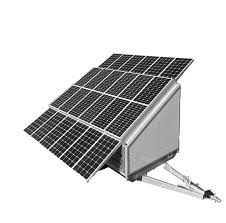In an era where sustainability is paramount, the quest for renewable energy sources has gained significant traction. Among the myriad of solutions, solar power stands out as a beacon of hope for a greener future. Solar power generators, in particular, have emerged as versatile and efficient devices capable of transforming sunlight into electricity, thereby reducing our reliance on fossil fuels and mitigating environmental degradation. This article explores the evolution, benefits, and applications of solar power generators in shaping a more sustainable world.
Evolution of Solar Power Generators
The concept of harnessing solar energy dates back centuries, but it wasn’t until the mid-20th century that significant advancements were made in solar technology. The development of photovoltaic (PV) cells, capable of converting sunlight into electricity, paved the way for the modern solar power industry. Initially confined to specialized applications such as space exploration, solar power gradually found its way into mainstream energy generation.
Early solar power generators were bulky, expensive, and inefficient, limiting their widespread adoption. However, rapid technological advancements, coupled with declining costs, have transformed solar energy into one of the most viable alternatives to traditional energy sources. Today, solar power generators come in various forms and sizes, catering to a wide range of applications from residential rooftops to utility-scale solar farms.
Benefits of Solar Power Generators
The allure of solar power generators lies in their numerous environmental, economic, and social benefits. Firstly, solar energy is abundant and inexhaustible, making it a sustainable solution for meeting our energy needs without depleting finite resources. By harnessing sunlight, solar power generators produce electricity with minimal environmental impact, reducing greenhouse gas emissions and combating climate change.
Moreover, solar power generators offer energy independence by decentralizing power production. With rooftop solar panels becoming increasingly common, homeowners can generate their electricity, reducing their reliance on centralized grid systems and potentially lowering energy bills. In rural and remote areas, solar power generators provide a lifeline by bringing electricity to communities previously lacking access to reliable power sources, thereby improving living standards and fostering economic development.
From an economic standpoint, the solar industry has become a significant driver of job creation and investment. As demand for solar technology continues to soar, manufacturers, installers, and service providers are reaping the benefits of a booming market. Furthermore, the scalability of solar power generators makes them suitable for various applications, from powering individual homes to supplying electricity to entire cities, offering flexibility in meeting diverse energy needs.
Applications of Solar Power Generators
The versatility of solar power generators lends itself to a multitude of applications across various sectors. In residential settings, rooftop solar panels are increasingly popular for homeowners looking to reduce their carbon footprint and save on electricity bills. Beyond residential use, solar power generators play a vital role in powering commercial and industrial facilities, providing a reliable and cost-effective source of clean energy.
In remote locations where access to the grid is limited or nonexistent, solar power generators offer a practical solution for electrification. Off-grid solar systems, equipped with batteries for energy storage, provide a reliable source of electricity for remote cabins, RVs, and telecommunications infrastructure. Additionally, solar-powered water pumps and irrigation systems enable agricultural communities to harness the sun’s energy for sustainable farming practices, enhancing food security and resilience to climate change.
Furthermore, solar power generators are integral to the transition towards sustainable transportation. Solar charging stations for electric vehicles (EVs) leverage sunlight to recharge batteries, extending the range and accessibility of EVs while reducing reliance on fossil fuels.
Conclusion
solar power generators (solar power generators) represent a paradigm shift in how we produce and consume electricity, offering a clean, renewable alternative to fossil fuels. As technology continues to improve and costs decline, solar energy is poised to play an increasingly prominent role in the global energy landscape. By harnessing the power of the sun, solar power generators hold the key to a brighter, more sustainable future for generations to come.
Harnessing the Power of the Sun: The Rise of Solar Power Generators
